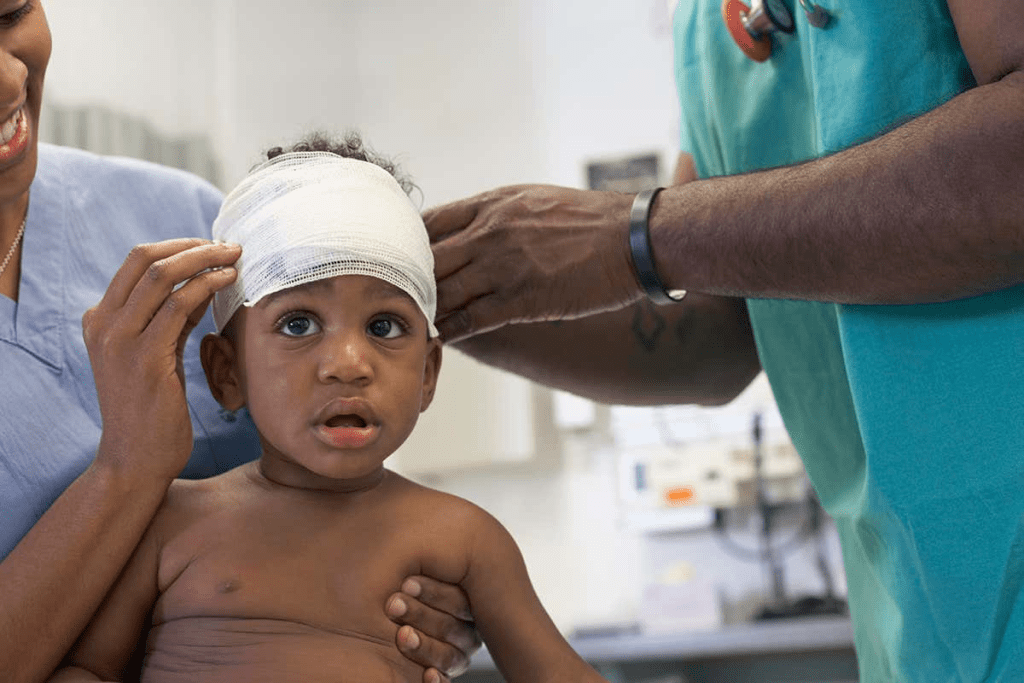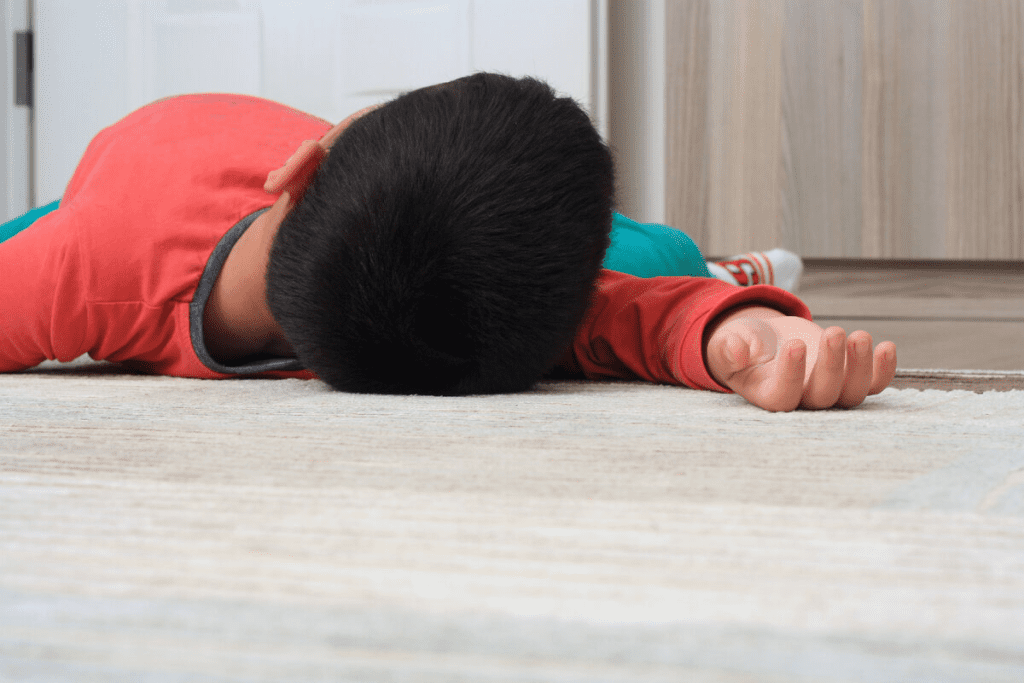Last Updated on November 13, 2025 by
Losing a child to cancer is a heart-wrenching experience for families. It affects them emotionally, physically, and socially. Parents must deal with a complex and painful grief.

No parent is ever ready to lose a child, even if they know it might happen. The grief that follows can hit hard at any time. It can affect a family’s life in many ways.
We understand the profound impact of such a grief of losing a son and are committed to providing support and guidance to those affected.
Cancer is a major killer of children worldwide, even with new medical technology. Every year, over 100,000 kids lose their battle with cancer. Brain tumours and leukemia are the top killers among them.
The impact of childhood cancer is huge, with some scary stats:
Brain tumours and leukemia are the most common cancers in kids. Brain tumours are tough because of where they are and the sensitive tissue around them. Leukemia affects the blood and bone marrow, needing strong treatments.

Survival rates for childhood cancer vary a lot between rich and poor countries. In rich countries, the 5-year survival rate is about 85%. But globally, it’s only 37.4%, and even lower in some poor areas. This shows we need better healthcare and treatments everywhere.
Dealing with childhood cancer is tough for kids and their families. Knowing the facts about childhood cancer is key to fighting this global health problem.
When a child gets cancer, families face tough medical choices and emotional struggles. The diagnosis changes everything, starting a journey that tests their strength.
The time after diagnosis is key. Parents must make big decisions for their child’s treatment while dealing with the news. This is a very emotional time, and families often feel lost.
The diagnosis moment feels surreal. Shock, denial, and fear mix, making it hard for families to understand. We know how important this moment is and the need for caring support.
As families start to adjust, they face the tough side of cancer treatment. Treatment plans can be long and hard, changing family life a lot. This includes moving for treatment or changing daily routines.
Going through the medical system is tough, adding to the stress families already feel. We help families understand their choices and make informed decisions about their child’s care. This includes understanding treatment options, managing side effects, and finding support services.
Talking well with doctors is key. Families need to feel supported and informed during treatment. We tell families to ask questions, get second opinions, and fight for their child’s needs.
Dealing with a childhood cancer diagnosis is hard. Families must balance hope with the tough realities of the disease. They need to accept the possible outcomes while keeping hope alive for their child’s recovery.
We help families understand the prognosis and make choices that fit them. This means talking openly about the diagnosis, treatment options, and what to expect during treatment.
By giving full support and guidance, we help families on this tough journey. We make sure they are ready to face the challenges ahead.
Losing a son or daughter to cancer is a pain no parent can imagine. It’s a tragedy that goes against nature, where parents are meant to live before their children. This “out of order” death makes parents face a grief unlike any other. The grief of losing a son is unimaginable, filled with deep pain, emotional struggles, and healing journeys that require love, support, and strength.

Parental grief after losing a child to cancer is intense and lasts long. Studies show that bereaved parents face higher risks of depression, anxiety, and health problems. The bond between a parent and child is deep, and losing a child changes it into lifelong grief.
Everyone grieves differently, but there are common feelings among bereaved parents. Losing a child to cancer means losing about 70 years of life. Parents think about all the milestones and experiences their child would have had.
The death of a child is seen as an “out of order” event. It breaks the natural order where children live longer than their parents. This unexpected loss makes grief complex, as parents adjust to life without their child.
Parents grieve not just the loss of their child but also the future they envisioned. The idea of 70 years of life lost shows the huge impact on a family’s future. It’s a way to understand the depth of their loss.
It’s important to understand the depth of parental grief after losing a child to cancer. By recognizing the unique aspects of their loss, we can offer better support. This helps them during their difficult time.
Losing a child to cancer is incredibly hard. It brings waves of grief that are tough to handle.
Every parent grieves differently, but they often go through various stages. Knowing these stages can help them deal with their loss.
At first, many parents feel shock and denial. They struggle to accept the loss. This stage is like a numbness that helps them cope temporarily.
As reality hits, anger and bargaining kick in. Parents might feel mad at themselves, doctors, or even their child. Bargaining is a way to try to control things again.
Depression is a big part of grieving. It shows as deep sadness, hopelessness, and a loss of interest in things they used to love. It’s a tough phase that needs support and understanding.
Acceptance comes slowly. It’s about learning to live with the loss and finding ways to remember the child. Having support from family, friends, and groups is key.
Finding the right sayings for grieving parents is hard. But just acknowledging their loss can help. Being real and understanding is important.
Grieving the loss of a child affects not just emotions but also the body. The pain can cause health problems, affecting how well parents feel overall.
When a child dies, parents may face many health issues. Cardiovascular problems are common, as grief can harm the heart. The immune system also weakens, making parents more likely to get sick.
Studies show bereaved parents are at risk for hypertension and diabetes. The physical effects of grief are real. It’s important for parents to get support for both their emotional and physical health.
Grieving parents often struggle with sleep, leading to chronic fatigue. The emotional pain makes it hard to sleep well, causing constant tiredness. This tiredness can make sadness and hopelessness worse, creating a hard cycle to break.
It’s key to tackle sleep issues to manage grief. Relaxation exercises, a regular sleep schedule, and a cozy sleep space can help. These steps can ease some sleep problems.
Loss of a child raises the risk of depression and anxiety. These mental health issues can show up physically, like changes in appetite or energy.
Bereaved parents need to know these risks and seek help if they feel depressed or anxious. Getting help early can greatly improve their well-being.
Losing a child to cancer is a huge shock that changes family life. The grief affects everyone in different ways. This creates a mix of emotions and challenges for the family.
When a child dies, it puts a lot of pressure on marriages and partnerships. Grief can make partners feel different, leading to tension. Communication is key during this time. Couples who talk openly and support each other can grow closer. But, if not handled well, grief can cause marital strain.
Studies show that grieving together can either bring couples closer or push them apart. Finding common ground in their grief can help them bond.
Siblings of the child who passed away also feel deep grief. They might feel guilty, angry, or confused. Parents and caregivers need to offer support and understanding.
This way, families can help siblings deal with their grief and adjust to the new family dynamics.
Extended family members are key in supporting the grieving family. They can offer emotional support, practical help, or just be there. Extended family support is vital in helping the immediate family cope with their loss.
“The support of our extended family was a lifeline during our darkest days. Their love and presence helped us navigate the unimaginable grief of losing our child.”
Families with strong support from their extended family often feel less alone in their grief. This helps them heal better.
Dealing with the loss of a child to cancer is tough. It needs a mix of professional support, self-care practices, and ways to remember the child. Parents must find ways to heal, and using good coping strategies is key.
Getting professional support is a big step in coping. This can be therapy, counselling, or joining support groups. These places let parents share their stories and find comfort with others who have lost children. Groups like Compassionate Friends help grieving families.
Self-care practices are vital during intense grief. Eating well, staying active, and getting enough sleep are important. These simple steps can help manage the emotional pain of grief.
Finding meaning after losing a child is a personal journey. Some create memorials, while others help fight childhood cancer. These actions help parents find purpose and keep their child’s memory alive.
By using these strategies, bereaved parents can cope with their grief better. Healing is a long journey that needs patience, support, and understanding. With the right help and mindset, recovery is possible.
Honouring your child’s memory can help you deal with grief. Creating a legacy for your child is a healing step. Every family’s journey is different, and so are the ways to honour a child’s memory.
Creating meaningful tributes is a way to honour your child. These can be personal, like:
These tributes remind you of happy times and your child’s impact on your life and others.
Many families find comfort in charity and advocacy work. This includes:
By doing this, parents can feel their child’s legacy is helping others.
Annual remembrances and healing rituals help in the grieving process. Examples include:
These rituals offer comfort and a connection to your child, even after they’re gone.
Honouring your child’s memory is a personal and ongoing journey. It’s okay to take your time and find what works best for you and your family. We are here to support you through this journey.
Losing a child to cancer is incredibly hard for parents. The support from loved ones is key to their healing. It’s important to be empathetic and understanding when they’re going through this.
Finding the right words for grieving parents can be tough. There’s no perfect phrase, but some words can offer more comfort. We should avoid clichés like “time heals all wounds.” Instead, choose heartfelt messages.
These comforting sayings show we understand their pain and that they’re not alone.
While comforting words are important, practical help is also valuable. There are many ways to support a family in grief.
These acts of kindness can ease some of their burden. It lets them focus on their grief.
The grief of losing a child to cancer lasts long after the funeral. It’s a long-term process that needs ongoing support. We should regularly check in, not just right after the loss.
By providing long-term support, we help bereaved parents feel less alone. They can navigate their loss with more support.
Losing a child to cancer is incredibly hard for parents. It leaves them with deep grief. The journey through this loss is complex, with many emotional, physical, and relational challenges.
Though grief is always deep when a child dies, most parents find happiness again with time. They start to find meaning in life once more.
Carrying the loss of a son or daughter is a lifelong journey. Yet, it’s possible to grow and keep living. Finding a path forward means acknowledging the pain of losing a child. It also means finding ways to honour their memory and live a meaningful life.
Every person’s grief journey is unique, and healing has no set timeline. Understanding the complexities of parental grief helps parents start to heal. They can seek support, take care of themselves, and find ways to remember and honour their child.
Finding the right words can be tough. You might say something like, “My heart goes out to you.” Or, “I’m so sorry for your loss.” Remember, “You’re not alone in your grief” can be very comforting.
Supporting someone who has lost a child means being there for them. Listen to them and offer help when you can. It’s important to be aware of their feelings and avoid clichés. Also, keep supporting them over time as they grieve.
Grief can affect people in many ways. They might feel shocked, angry, or depressed. They could also have trouble sleeping or feel very tired. Everyone’s grief is different.
Coping with the loss of a child is hard. They might seek professional help or practice self-care. Finding ways to remember their child can also help them cope.
There are many ways to honour a child’s memory. You could create a tribute or help a charity. Participating in remembrance events or healing rituals can also be meaningful.
Losing a child can change a family a lot. It can affect marriages and relationships with siblings and extended family. Every family is different, but support is key during this time.
Childhood cancer is a big issue worldwide. Survival rates vary a lot between countries. This shows how important it is to keep researching and supporting families affected by childhood cancer.
Helping a grieving parent means being there for them. Listen to them and offer help when you can. Be patient and understanding, as their grief can last a long time.
Coping with a child’s terminal illness is tough. Seek support, take care of yourself, and cherish the time you have left. Exploring these strategies can help you get through this hard time.
Dealing with the loss of a loved one due to cancer is hard. It’s important to support each other, talk openly, and cherish the time you have left. Getting professional help can also be very helpful.
Subscribe to our e-newsletter to stay informed about the latest innovations in the world of health and exclusive offers!